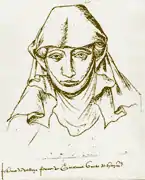Joan of Valois, Countess of Hainaut
Joan of Valois (c. 1294 – 7 March 1342) was a Countess consort of Hainaut, Holland, and Zeeland. She was the second eldest daughter of the French prince Charles, Count of Valois, and his first wife, Margaret, Countess of Anjou.[1] As the sister of King Philip VI of France and the mother-in-law of Edward III,[2] she was ideally placed to act as mediator between them.[2]
| Joan of Valois | |
|---|---|
| Countess of Hainaut, Holland, and Zeeland | |
 | |
| Tenure | 1305–1337 |
| Born | 1294 Longpont, Aisne, France |
| Died | 7 March 1342 Fontenelle Abbey, Maing, France |
| Spouse | William I, Count of Hainaut |
| Issue Detail | William II, Count of Hainaut Margaret II, Countess of Hainaut Philippa, Queen of England Joanna, Duchess of Jülich |
| House | Valois |
| Father | Charles, Count of Valois |
| Mother | Margaret, Countess of Anjou |
Lineage
Her paternal grandparents were Philip III of France and Isabella of Aragon. Her maternal grandparents were Charles II of Naples and Maria Arpad of Hungary. Joan was one of six children. In 1299, Joan's mother died, probably in childbirth, and her father married his second wife, Catherine I of Courtenay, Titular Empress of Constantinople, by whom he had four more children. He would marry his third wife, Mahaut of Châtillon, in 1308, and by her he would sire a son and three daughters, among them Isabella of Valois, who became Duchess of Bourbon, and Blanche of Valois, who married Charles IV, Holy Roman Emperor.
Countess of Hainaut
Joan married William I,[3] on 23 May 1305. She was a supporter of her cousin Isabella of France in her struggle against Edward II. In December 1325, she traveled to France to attend the funeral of her father and had talks with Isabella and Charles IV of France. This brought about an alliance between Hainaut, Isabella, and the English exiles, who were in opposition to the English king and his favorite, Hugh Despenser the Younger. Isabella's son became engaged to Joan's daughter Philippa and Isabella raised an army in their lands. It was also from there that Isabella and her lover, Roger Mortimer, began their invasion of England.
In 1332, after Philippa had become queen, she arranged a wedding between Isabella's daughter Eleanor of Woodstock and Reginald II, Duke of Guelders,[4] and she visited her daughter Philippa in England.
Mediator
After her husband died in 1337, Joan took the veil and entered into Fontenelle Abbey in Maing. In 1340, her son-in-law dealt her brother Philip a heavy blow by defeating him at sea near Sluys. Edward then went on to besiege Tournai, but was beset by financial problems. Pope Benedict XII then asked Joan to mediate. She first went to her brother, whom she had begged for peace. Then she went to Edward in his tent and begged him for peace as well. The pleas of their relative Joan, sent by the pope, allowed the two men to sign a truce without loss of face.[5]
Issue
Joan's children with William I
- William II, Count of Hainaut (1307–1345)
- John (died 1316)
- Empress Margaret (1311–1356), married Louis IV, Holy Roman Emperor
- Queen Philippa (24 June 1314 – 1369), married king Edward III of England[6]
- Agnes (died 1327)
- Johanna von Jülich (1315–1374), married William V, Duke of Jülich
- Isabella of Hainaut (1323–1361), married Robert of Namur
- Louis (1325–1328)
Notes
- Katheryn Warner, Isabella of France, The Rebel Queen, (Amberley Publishing, 2017), 14.
- Jonathan Sumption, The Hundred Years War:Trial by Battle, Vol. I, (Faber & Faber, 1990), 357-358.
- Katheryn Warner, Isabella of France, The Rebel Queen, (Amberley Publishing, 2017), 14.
- "Finding Eleanor of Woodstock: Broederenchurch in Deventer & Castle Rosendael in Rozendaal - History of Royal Women". History of Royal Women. 2015-05-17. Retrieved 2018-06-18.
- Mortimer, Ian (2008). The Perfect King The Life of Edward III, Father of the English Nation. Vintage. pp. 179–180.
- Katheryn Warner, Isabella of France, The Rebel Queen, (Amberley Publishing, 2017), 14.